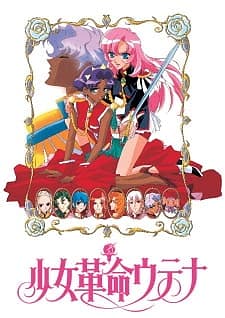Alternative Titles
Synonyms: Shoujo Kakumei Utena
Japanese: 少女革命ウテナ
English: Revolutionary Girl Utena
French: Revolutionary Girl Utena
Information
Episodes:
39
Status:
Finished Airing
Aired:
Apr 2, 1997 to Dec 24, 1997
Broadcast:
Wednesdays at 18:00 (JST)
Source:
Original
Duration:
23 min. per ep.
Rating:
PG-13 - Teens 13 or older
Statistics
Score:
8.221 (scored by 6832768,327 users)
Ranked:
#368 2
2
based on the top anime page. Please note that 'Not yet aired' and 'R18+' titles are excluded.
Popularity:
#1124
Members:
234,343
Favorites:
9,071
Resources
|
|





















































































































